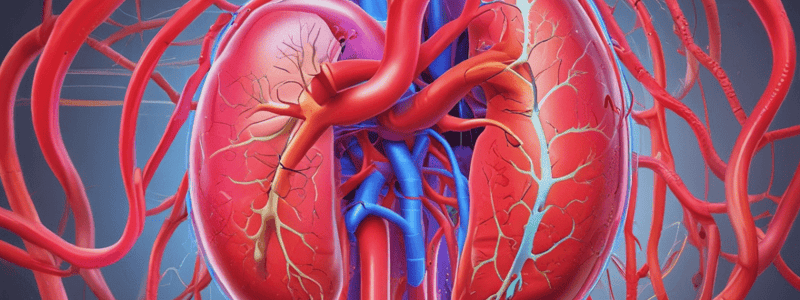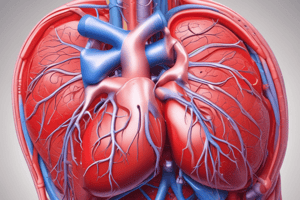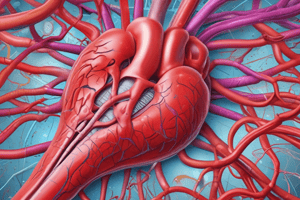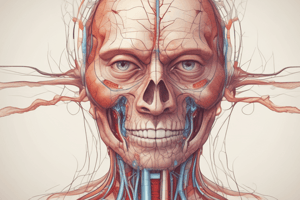Podcast
Questions and Answers
What is the primary function of the kidneys in regulating long-term blood pressure?
What is the primary function of the kidneys in regulating long-term blood pressure?
- Controlling nervous and hormonal input
- Regulating salt and water balance (correct)
- Regulating total peripheral resistance
- Regulating cardiac output
What is the Guyton model for long-term blood pressure regulation based on?
What is the Guyton model for long-term blood pressure regulation based on?
- The interaction of the renal function curve and the salt and water intake curve (correct)
- The interaction of cardiac output and total peripheral resistance
- The interaction of nervous system control and renal function
- The interaction of baroreceptor reflexes and hormonal regulation
How does an abrupt increase in total peripheral resistance affect long-term blood pressure according to the Guyton model?
How does an abrupt increase in total peripheral resistance affect long-term blood pressure according to the Guyton model?
- It causes a gradual increase in blood pressure over time
- It has no effect on long-term blood pressure
- It causes a short-term increase in blood pressure that rapidly returns to normal (correct)
- It causes a permanent increase in blood pressure
What is the mechanism by which increased arterial pressure leads to increased renal water loss?
What is the mechanism by which increased arterial pressure leads to increased renal water loss?
What is the mechanism by which increased arterial pressure leads to increased renal salt loss?
What is the mechanism by which increased arterial pressure leads to increased renal salt loss?
According to the Guyton model, what are the two mechanisms available to move the equilibrium point of long-term blood pressure regulation?
According to the Guyton model, what are the two mechanisms available to move the equilibrium point of long-term blood pressure regulation?
What is the main determinant of extracellular fluid volume according to the text?
What is the main determinant of extracellular fluid volume according to the text?
Which mechanism explains how a small increase in cardiac output leads to a much larger increase in arterial pressure?
Which mechanism explains how a small increase in cardiac output leads to a much larger increase in arterial pressure?
What is the most common result of impaired renal fluid excretion regarding chronic hypertension?
What is the most common result of impaired renal fluid excretion regarding chronic hypertension?
What is the primary cause of volume-loading hypertension according to the text?
What is the primary cause of volume-loading hypertension according to the text?
In volume-loading hypertension, what is the consequence of increased arterial pressure and total peripheral resistance?
In volume-loading hypertension, what is the consequence of increased arterial pressure and total peripheral resistance?
What is the result of increased fluid volume in volume-loading hypertension?
What is the result of increased fluid volume in volume-loading hypertension?
What is the primary mechanism underlying volume-loading hypertension?
What is the primary mechanism underlying volume-loading hypertension?
What is the role of the renin-angiotensin-aldosterone system in hypertension?
What is the role of the renin-angiotensin-aldosterone system in hypertension?
What is the main difference between one-kidney and two-kidney Goldblatt hypertension?
What is the main difference between one-kidney and two-kidney Goldblatt hypertension?
What is the primary mechanism underlying preeclampsia-induced hypertension?
What is the primary mechanism underlying preeclampsia-induced hypertension?
What is the main characteristic of coarctation of the aorta-induced hypertension?
What is the main characteristic of coarctation of the aorta-induced hypertension?
What is the primary cause of neurogenic hypertension?
What is the primary cause of neurogenic hypertension?
What is the primary mechanism responsible for the transient increase in blood pressure following disruption of the baroreceptor nerves?
What is the primary mechanism responsible for the transient increase in blood pressure following disruption of the baroreceptor nerves?
Which of the following is a hallmark characteristic of autonomic hyperreflexia?
Which of the following is a hallmark characteristic of autonomic hyperreflexia?
Which of the following is NOT a characteristic of primary hypertension?
Which of the following is NOT a characteristic of primary hypertension?
Which of the following is NOT a recommended treatment approach for primary hypertension?
Which of the following is NOT a recommended treatment approach for primary hypertension?
Which of the following systems is involved in the rapid (seconds to minutes) regulation of blood pressure?
Which of the following systems is involved in the rapid (seconds to minutes) regulation of blood pressure?
Which of the following statements about autonomic hyperreflexia is TRUE?
Which of the following statements about autonomic hyperreflexia is TRUE?




